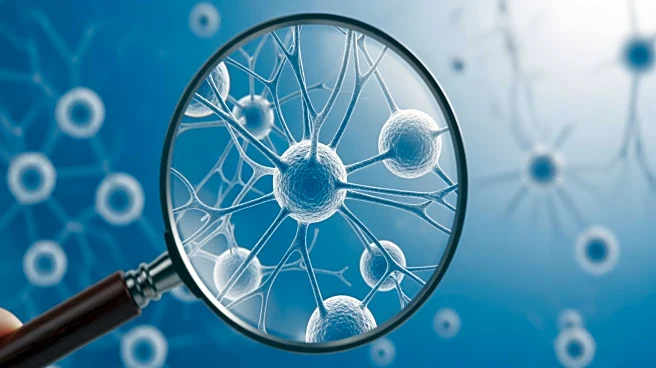What's Happening?
A recent study published in Nature delves into the mechanistic basis of protein conjugation within a diverged bacterial ubiquitination pathway. The research highlights the structural and chemical processes involved in ubiquitin-like protein conjugation,
which is crucial for various cellular functions. The study provides insights into how these pathways have evolved in bacteria, offering a detailed analysis of the structures and mechanisms that underpin these processes. This research is significant as it sheds light on the complex interactions and evolutionary adaptations of bacterial systems, which have parallels in eukaryotic organisms.
Why It's Important?
Understanding bacterial ubiquitination pathways is crucial for several reasons. Firstly, it enhances the scientific community's knowledge of bacterial physiology and its evolutionary parallels with eukaryotic systems. This can lead to advancements in biotechnology and medicine, particularly in developing new antibiotics or treatments targeting bacterial infections. Additionally, the study's findings could have implications for understanding bacterial resistance mechanisms, which is a growing concern in public health. By exploring these pathways, researchers can identify potential targets for novel therapeutic interventions, potentially benefiting industries focused on drug development and healthcare.
What's Next?
Future research may focus on further elucidating the specific roles of ubiquitin-like proteins in bacterial defense mechanisms and their interactions with host organisms. This could involve exploring the potential for manipulating these pathways to enhance bacterial susceptibility to existing treatments. Additionally, there may be interest in investigating how these findings can be applied to other bacterial species or even in synthetic biology applications. The study opens avenues for interdisciplinary collaboration, combining microbiology, biochemistry, and pharmacology to address pressing challenges in bacterial resistance and treatment.
Beyond the Headlines
The study also raises questions about the ethical implications of manipulating bacterial pathways for human benefit. As researchers explore these mechanisms, considerations around the potential impacts on ecosystems and microbial communities must be addressed. Furthermore, the long-term effects of such interventions on bacterial evolution and resistance patterns warrant careful examination. These aspects highlight the need for a balanced approach that considers both scientific advancement and ecological sustainability.
















